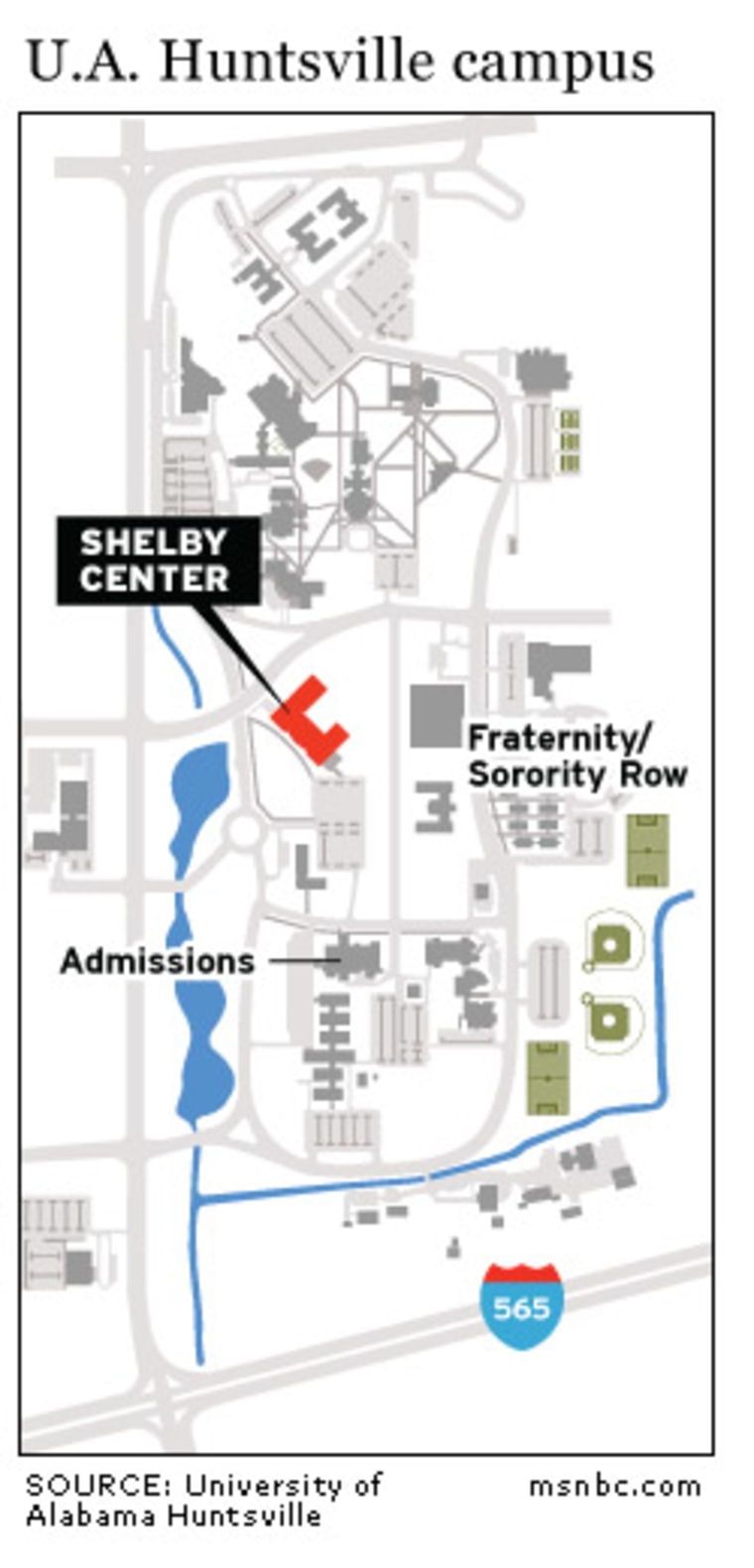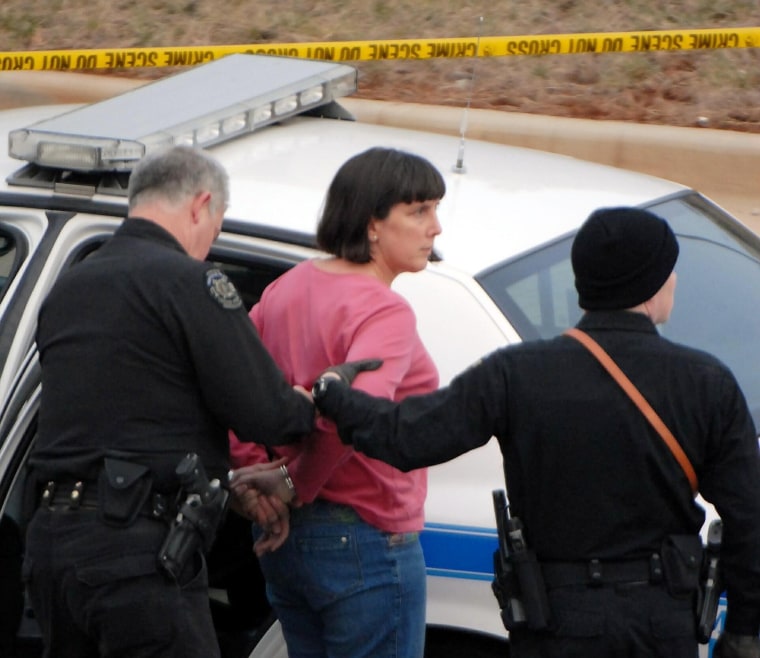The University of Alabama-Huntsville biology professor accused of killing three colleagues fatally shot her brother in Massachusetts more than two decades ago, police said Saturday.
The revelation by Braintree, Mass., police that Amy Bishop, then 20, shot her 18-year-old brother, Seth M. Bishop, in 1986 raised troubling questions over how that incident was handled. Bishop was never charged and police reports on the case have gone missing.
The Boston Globe reported at the time that Amy Bishop had accidentally shot her brother. It quoted then-Braintree Police Chief John Polio as saying that Bishop had asked her mother, Judith, in the presence of her brother how to unload a round from the chamber of a 12-gauge shotgun when the weapon went off. Seth Bishop was struck in the abdomen and died at a hospital 46 minutes after the Dec. 6, 1986 shooting, according to the report.
"Every indication at this point in time leads us to believe it was an accidental shooting," Polio said at the time, according to the Globe.
But Braintree Police Chief Paul Frazier, at a news conference Saturday, offered a different account of the 1986 shooting, based on the recollection of one of the arresting officers. According to that officer, Amy Bishop fired three shots during an argument at the family home, then fled. At one point she pointed the shotgun at a motorist before being arrested at gunpoint behind a business, Frazier said.
Frazier said Bishop was being booked into jail when then-Chief Polio, or someone on his behalf, called and ordered the booking process stopped. Bishop was then released to her mother.
Missing recordsFrazier said the records from the case have been missing since at least 1987. "I don't want to use the word 'cover-up,' but this does not look good," he said.
“I was not on duty at the time of the incident, but I recall how frustrated the members of the department were over the release of Ms. Bishop," Frazier said. "The release of Ms. Bishop did not sit well with the police officers and I can assure you that this would not happen in this day and age.”
Frazier said he would meet with the mayor and the district attorney to discuss the "troubling" case. "The mayor supports a full review of this matter and agrees that we want to know where the records are,” he said.
In an interview at his home Saturday, Polio, 87, told the Globe: "There was no cover-up." He said he followed all department procedures and then-District Attorney William Delahunt's office conducted an inquiry and the decision was made not to file charges.
Delahunt, now a U.S. representative, could not immediately be reached for comment.
Tenure dispute
Bishop, 44, is accused of gunning down three of her colleagues Friday during a University of Alabama-Huntsville faculty meeting in an apparent tenure dispute. Three others were wounded — a rare instance of a woman being accused in a mass shooting.
William Setzer, chairman of chemistry department at UAH, said Bishop was appealing a tenure decision made last year.
"Politics and personalities" always play a role in the tenure process, he said. "In a close department it's more so. If you have any lone wolves or bizarre personalities, it's a problem and I'm thinking that certainly came into play here."
Bishop, a Harvard-educated neurobiologist who became an assistant professor at the school in 2003, was taken Friday night in handcuffs to the county jail, and said as she got into a police car: "It didn't happen. There's no way. ... They are still alive."
Bishop's husband was also detained for questioning but police did not call him a suspect.
On Friday, Bishop presided over her regular class before going to a biology faculty meeting where she sat quietly for about 30 or 40 minutes, one University of Alabama faculty member told the New York Times. Then, she pulled out a gun and began shooting, firing several rounds before her gun either jammed or ran out of bullets, said the faculty member, who had spoken to people that were in the room.
After she left the room, he said, the remaining people barred the door, fearing she would return. She was arrested outside the building without incident.
Described as strange, intelligentDescriptions of Bishop from students and colleagues were mixed. Some saw a strange woman who had difficulty relating to her students, while others described a witty, intelligent teacher.
Students and colleagues described Bishop as intelligent, but someone who often had difficulty explaining difficult concepts.
Bishop was well-known in the research community, appearing on the cover of the winter 2009 issue of "The Huntsville R&D Report," a local magazine focusing on engineering, space and genetics. However, it was unclear how many of her colleagues and students knew about a more tragic part of her past.
After being educated at Harvard University, Bishop moved to Huntsville and in 2003 became an associate professor at the University of Alabama's campus there. The school, with about 7,500 students, has close ties with NASA and is known for its engineering and science programs.
Setzer, the chemistry chairman, said he was not aware of the incident with Bishop's brother.

Bishop and her husband placed third in a statewide university business plan competition in July 2007, presenting a portable cell incubator they had invented. They won $25,000 to help start a company to market the device.
Police said Bishop was quickly caught after Friday's shooting. A 9-millimeter handgun was found in the bathroom of the building where the shootings occurred, and Huntsville police spokesman Sgt. Mark Roberts said Bishop did not have a permit for it.
Festering grievance?
Several experts said campus shootings commonly occur because the shooter has some kind of festering grievance that university officials haven't addressed, and the granting of tenure can be a polarizing and politicized process for many academics.
"Universities tend to string it out without resolution, tolerate too much and to have a cumbersome decision process that endangers the comfort of many and the safety of some," said Dr. Park Dietz, who is president of Threat Assessment Group Inc., a Newport Beach, Calif.-based violence prevention firm.
Tenure, which makes firing and other discipline difficult if not impossible, can seem generous to outsiders. But the job protection gives professors the freedom to express ideas and conduct studies without fear of reprisal. The system typically emphasizes research over teaching, and tenured professors typically are paid more.
While it's rare for the stresses of the tenure process to incur violence, what's even rarer is for a woman to be accused in such an incident like the one Friday that also left three of Bishop's colleagues injured, two critically.
"Workplace shootings of that kind are overwhelmingly male," said Franklin E. Zimring, a law professor and director of violence prevention at the University of California, Berkeley. "Going postal was essentially a monopoly position of the XY chromosome."
